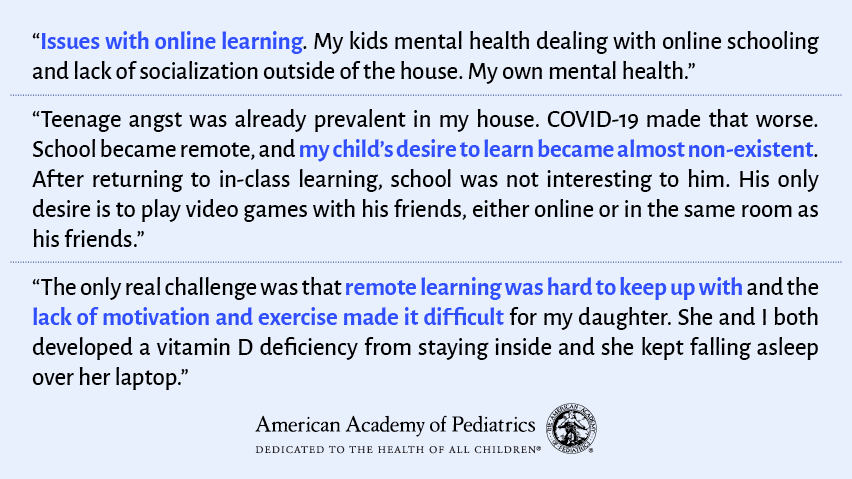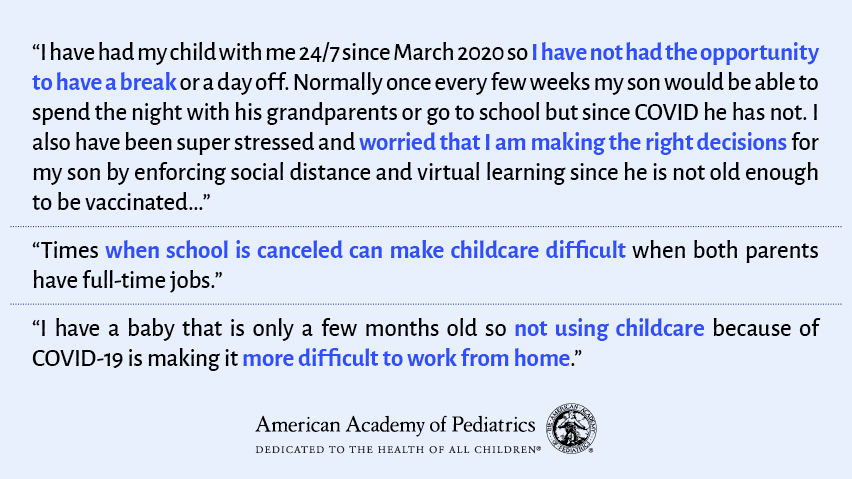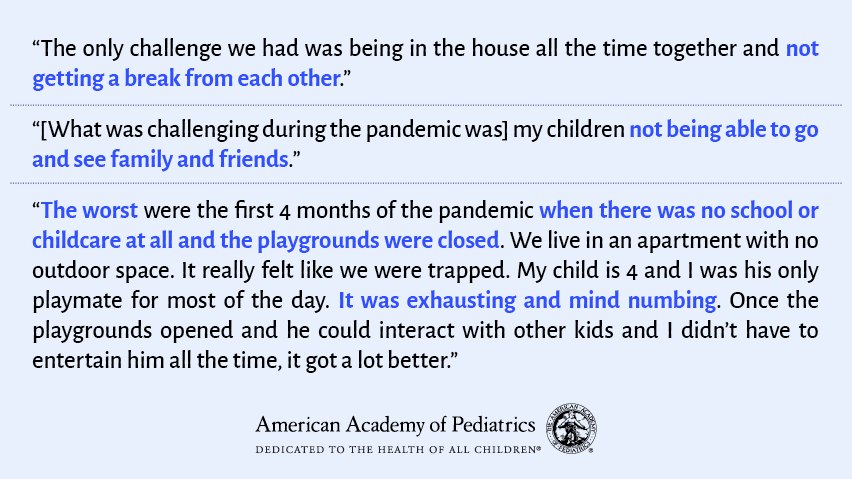In our previous qualitative report, In the Words of Parents Part 1, we discussed how changes to family economic stability and transitions to remote work affected the lives of parents and caregivers in many ways. While some families struggled significantly, many also found ways to build positive experiences for their children.
In the second part of this qualitative report, we continue to summarize responses from a sample of 250 parents and caregivers, randomly selected from nine-thousand survey respondents when asked about the challenges and things that helped during the pandemic (November 2020 – March 2021). In this report, we explore responses from parents about handling disruptions to children’s education, with many reflecting on transitions to online learning. We also discuss how childcare challenges and changes in parental responsibility affected parents in our sample.
In general, most families initially struggled with the transition to remote learning. Parents shared what helped to ease the transition, including having a supportive school system, and what challenges remained consistent, such as children’s lack of motivation and lack of socialization outside of the home.
Education and Remote School
As the primary point of engagement for young children, many families spoke about school, and how remote learning changed the dynamic between parent, teacher, and child. The transition away from in-person education was difficult for many, especially early on. Children and parents both missed the regular social interaction, engagement, and relationship building opportunities at school. Some parents worried that this disruption had negative effects on mental health across the family. In many cases, parents struggled to keep their child motivated without the structure of the school environment, and worried about future academic progress.

Many families responded that difficulties with schoolwork faded, or that their families were finding ways to adapt to new circumstances. After initial struggles, some families found that they and their child grew accustomed to online learning. Others noted the convenience of being able to set their own schedules and find new routines to promote positive experiences for children.

In addition to balancing schedules, some caregivers felt challenged by balancing roles, with many feeling that they were becoming their child’s parent and teacher all in one. A lack of information often left parents and caregivers feeling unprepared to educate at home. The stress of working out a new education system caused tension for some families, and parents reported relationship challenges with their children over remote schoolwork.

Across the respondents, the help of supportive education systems was essential to these families, allowing them to access resources and assistance to navigate remote learning. Caregivers greatly appreciated educators who partnered with them to help their children. This experience offered some new insight into their child’s educational world, allowing them to feel closer and learn together.

Childcare Changes
In addition to school arrangements, access to childcare often changed for parents and families during the COVID-19 pandemic. Childcare services became essential when children were no longer in school during hours when caregivers worked. Some parents were supported by access to childcare services that could assist them with care duties, especially as they navigated changes in work and employment. Connections to others also helped caregivers to care for their children; parents who were able to call on family and friends for childcare often noted how it helped them through the pandemic.

Still, for many caregivers of young children, childcare arrangements were challenged by the pandemic. As childcare centers closed and social distancing limited outside interaction, parents often saw an increase in caregiving time among already busy work and home schedules. Those who reported loss or closure of childcare services struggled significantly, especially in cases where the parent was employed (Read more about how changes in work, finances, and remote employment affected parents in our previous qualitative report).

Throughout the pandemic, the inability to socialize safely negatively impacted parents and children alike, as the loss of important relationships was widely felt. For some, this also meant a loss of planned childcare. Without these supports, working parents often dealt with increased childcare responsibilities alongside work, and often commented on the difficulty of juggling these roles.

Time Spent at Home
Lack of outside childcare and remote education contributed to parents spending more time at home with their children. For some families, spending long hours in the home balancing multiple roles took its toll on caregivers, and many felt that they had very limited time to relax. With children out of normal childcare and school activities, safe outlets to play and engage with others became harder to find. Caregivers often felt the tension of restricting the activities their children could engage in and worried about their children missing out on everyday interactions, such as seeing friends and family. For some, lockdowns limiting safe outlets to play and engage with others caused increased tension for the parent and family. Caregivers overall felt the impact of increased care hours, and this affected their relationships with children and others.

However, caregivers also enjoyed the increased opportunity for bonding with children and family during time usually taken up by other life responsibilities. The same changes to work and school that may have caused disruptions also allowed some parents to spend more time bonding with their children. Though families struggled with spending too much time together, being away from work and school increased connectedness within some households; it even gave families the chance to build new positive experiences. Spending time learning new things together often created stronger feelings of closeness within families.

Caregivers often mentioned being grateful for connections to friends, family, and neighbors outside the home as a source of support and relief for household tension. These bonds often allowed for more access to activities for children throughout the pandemic.

In addition to social support, professional care resources were also helpful for caregivers as they navigated parenting stress and health concerns.

Throughout these challenges, families often spoke of the growth they felt in their closeness to these support systems, as well as to one another.

In their own words, parents surveyed spoke about the challenges they faced since the start of the COVID-19 pandemic, and the helpful factors that may have positively contributed to their family lives. Through these two qualitative reports, we explored what parents found the most important, most impactful, or most necessary in raising their children. This sample of statements can help providers understand how the pandemic may have affected those they serve.
Last Updated
02/01/2022
Source
American Academy of Pediatrics